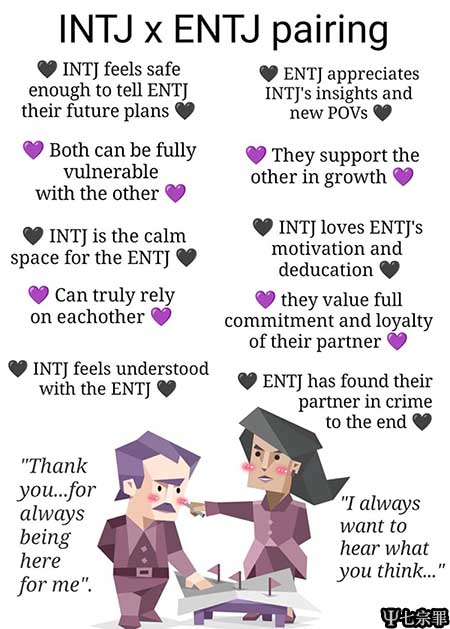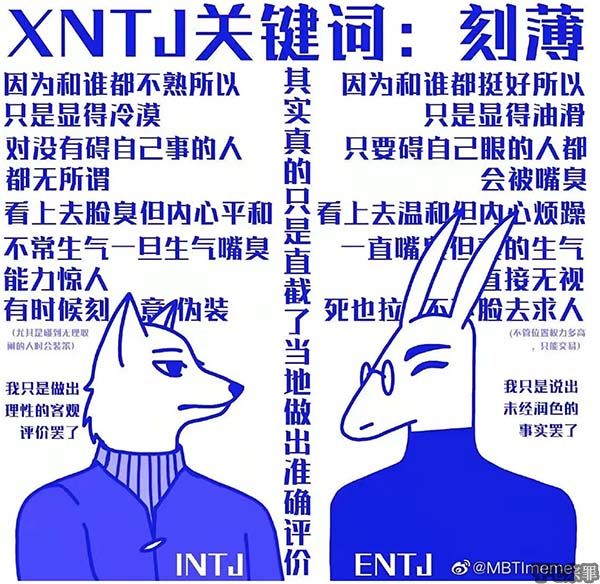INFJ Personality Type: Lover of Beauty & Wisdom
INFJ的人格类型:美与灵的追随者
INFJs are “old souls.” Many grow up feeling wiser than would be predicted by their chronological age. Having discovered the value of their Introverted Intuition (Ni) quite early in life, INFJs grow to trust its judgments and insights. Even as children and adolescents, INFJs can be found advising and counseling their friends and siblings, and perhaps even adult family members. They tend to feel happiest and most fulfilled when helping and enlightening others through their insights.
INFJ通常是“老灵魂”,他们看上去总是比实际年龄要更沉稳睿智。由于在人生的很早期,INFJ就已经很好地培养了他们[内向直觉(Ni)]的功能,因此他们通常倾向于信任自己的判断和见解。即使是在孩童与青少年时期,INFJ们就常常能为他们的朋友、兄妹、甚至成年家庭成员提供建议和咨询意见。他们觉得最有幸福感和满足感的时候就是在用自己的智慧去帮助别人和启发别人的时候。

Because of their strength of intuition (and commensurate detachment from physical reality), many INFJs report feeling like aliens in the world. One INFJ described her experience as “a perpetual sense of deja vu.” Others report feelings of disembodiment. The fact is that many INFJs (and INTJs) seem to experience the world and their bodies quite differently than other types do. It is therefore not uncommon for INFJs to question their own sanity.
由于他们的直觉力(某种对现实生活的超然状态),使得很多INFJ都感觉他们自己像是这个星球上的外星人。一位INFJ把她的经历描述为“一种永久的似曾相识的感觉”。另一些人则认为那是一种灵魂出窍般的超脱感。事实是,很多INFJ(以及INTJ)似乎都比其他类型的人更加对这个世界有着不同寻常的感官体验。因此,对于INFJ来说,怀疑自己的理性并不罕见。
INFJs see two people in everyone. They see the public persona, the outer shell, which everyone else sees. But more important, their Ni provides a deeper sense or impression of people, penetrating appearances and revealing hidden motives and intentions. Consequently, INFJs often feel they can see people more clearly than those people can see themselves.
INFJ通常能看到每个人身上的两面性。他们不仅能看到——其他人都能看到的——表面的部分,更重要的是,[内向直觉(Ni)]的功能使得他们对人有一种更深层次的判断——能穿透表面、揭露隐藏的动机和意图。因此,INFJ经常觉得他们比那些人自己更透彻地了解他们。
To fully understand INFJs, it is necessary to recognize the full implications of their dominant function, Ni, being a Perceiving function. Namely, INFJs are far less serious inwardly than they appear outwardly (ENFJs, whose dominant function is a Judging function, are characteristically more serious). INFJs’ inner world is well described as playful, imaginative, colorful, mischievous, and daring. They love playing with ideas, perspectives, theories, images, symbols, and metaphors.
要充分地了解INFJ,就必须理解他们的主导功能[内向直觉(Ni)]——作为一种感知功能的含义所在。也就是说,在内心深处,INFJ其实远没有表面看上去那么严肃(对比来看:ENFJ由于其主导功能是判断功能,所以反而要更严肃)。INFJ的内心世界被描述为有趣的、富有想象力的、丰富多彩的、孩子气的和大胆的。他们喜欢玩弄思想、观点、理论、图像、符号和隐喻。
INFJs also enjoy listening to music, watching movies and television, and engaging with people. Perhaps more than anything, they love spending time engrossed in meaningful conversation, which allows them to simultaneously engage their Ni and auxiliary Fe functions. Talking affords INFJs the opportunity to help and enlighten others through their insights. And because of their loquaciousness, INFJs may at times be mistaken for Extraverts.
INFJ还喜欢听音乐、看电影、看电视、与人打交道。最重要的是,他们喜欢花时间在有意义的谈话中,这使得他们能够同时发挥到他们的主导功能[内向直觉(Ni)]以及辅助功能[外向情感(Fe)]。“对话”提供了INFJ帮助和启发他人的机会。而且由于他们的健谈(某些情况下),INFJ还常常会被误认为是性格外向的人。
A signature feature of INFJs (and INTJs) is a deep concern for quality. They long to see their Ni ideals actualized in physical reality (Se). Consider the following excerpt from My True Type:
INFJ(以及INTJ)的一个标志性特征是:对“质”的深切关注。他们渴望看到自己Ni的理想在现实生活中得到真正的实现。以下是对这一真实人格型的部分摘录:
While Se attends the appearance of things, Ni is concerned with their deeper qualities and substantiveness…While INJs are to some extent concerned with appearances, they are more attuned to the underlying quality and craftsmanship of things…ensuring that things are substantive, thoughtfully-crafted, and otherwise amenable to their Ni-Se tastes. NFJs, in particular, exhibit the most refined (or what other types might deem expensive or pretentious) tastes of all types. The popular television comedy, Frasier, is a great example. Much of the show’s humor revolves around the sophisticated snobbiness of Frasier (ENFJ) and his brother Niles (INFJ). This includes flaunting linguistic formalisms and a high-brow vocabulary, as well as frequent allusions to fine dining, classical music, designer clothing, and the like.
[外向感觉(Se)]的功能更在意事物的外在表象,与此相对的,[内向直觉(Ni)]的功能更关注深层次的“性质”和“本源”。例如:即使INJ在某种程度上也会关心外表,但他们更在意事物的内在质量和工艺,确保事物是实质性的、精心制作的、至少是符合他们自己“Ni-Se”品味的。更特殊的是,NFJ就更加是所有人格型中最“精致”的型(有时甚至会被其他类型的人觉得是虚伪或做作的)。流行电视喜剧《Frasier》就是一个很好的例子,这部剧的大部分幽默都诞生于Frasier(ENFJ)和他的兄弟 Niles(INFJ)身上的“自命不凡”,这包括他们用吊书袋的形式主义和高格调的词汇进行语言炫耀,以及用美食、古典音乐、名牌设计等自我标榜。
Like the INFP personality type, INFJs can struggle with depression. This may stem from feeling chronically unheard, useless, or misunderstood, as well as from dissatisfaction with the INFJ’s careers or the INFJ’s relationships. Because Ni perceives the world so differently and profoundly, INFJs often experience a sense of loneliness and isolation, even when they are with other people. Depression may also arise from feeling that their ideals and insights are not being recognized or actualized in the world. They may see the world as deaf to, or unconcerned with, the truths they espouse. INFJs may therefore question their value in a world that seems indifferent to their insights.
与INFP型人格一样,INFJ也可能会与“抑郁”作斗争。这也许源于长期的无人理解、长期的徒劳感与无力感、被误解、或是来自于职业和两性关系中长期积压的不满。因为[内向直觉(Ni)]功能对世界的感知是如此的不同与深刻,因此,INFJ经常经历一种孤独感和孤立感,即使和其他人待在一起。“抑郁”也可能来自于他们觉得自己的“理想”和“见解”在世界上没有得到认可或实现,他们觉得这个世界就像是个聋子——对他们所信奉的真理毫不关心。因此,在一个对他们的“见解”漠不关心的世界里,INFJ可能会质疑他们存在的价值。
The INFJ personality type is among the rarest of the 16 types, constituting only 1-2% of the general population. Unlike the INTJ personality type, in which males predominate, there is greater gender parity among INFJs, with nearly equal numbers of males and females.
INFJ型人格是16种类型中最罕见的一种,仅占普通人群的1 – 2%。不同于男性占主导地位的INTJ型人格类型,在INFJ中,男性和女性数量几乎相同。
- INFJ Personality Type Development & Functional Stack
- INFJ的人格发展与功能类型
Each personality type prefers to use four of the eight functions first described by Jung. These four functions comprise a type’s “functional stack.” The relative strength of preference for these four functions is expressed in the following manner: dominant, auxiliary, tertiary, and inferior. INFJs’ first preference is Ni, followed by Fe, Ti and Se respectively. This is depicted in the arrangement of their functional stack:
每种人格型都倾向于使用荣格所描述的八种功能中的四种。这四个功能组成了一种“人格”的“功能类型”。这四个功能的相对强度以下列方式排序:主导功能、辅助功能、第三功能和第四功能。INFJ的主导功能是Ni功能,其次是Fe功能,Ti功能和Se功能。以下是具体描述:
- INFJs’ Functional Stack
- INFJ的功能类型
Dominant: Introverted Intuition (Ni)——主导功能:内向直觉Ni
Auxiliary: Extraverted Feeling (Fe)——辅助功能:外向情感Fe
Tertiary: Introverted Thinking (Ti)——第三功能:内向思考Ti
Inferior: Extraverted Sensing (Se)——第四功能:外向感觉Se
While we will soon discuss each function in greater depth, for now, we will turn to another feature of INFJs’ personality—their type development. As is true for all types, INFJs’ type development consists of three general phases. These phases roughly correspond to the ordering of the functional stack, with Ni being the first function to blossom, Fe the second, on so on. But as we will see, the inferior function is sort of a special case, summoning INFJs’ attention at an earlier phase than might otherwise be expected.
虽然我们很快就会开始深入地讨论每一个功能,但是现在,我们先转向INFJ的另一个特性——他们的人格发展。正如所有类型一样,INFJ的人格发展包括三个阶段。这些阶段的发展过程大致相当于“功能类型”的排序过程,Ni功能是第一个发展的功能,以此类推是Fe功能,Ti功能和Se功能。但正如我们所看到的那样,第四功能Se是一种特殊的情况,期望它能在较早的阶段就唤起INFJ的注意力,显然是不可能的。
Phase I (Childhood) ——阶段一(孩童期)
Early in life, INFJs are characterized by the development and dominance of their Introverted Intuition (Ni). Since they are Introverts, they may also show significant development of their second function, Extraverted Feeling (Fe), which can serve as a useful extraverted tool for navigating the outside world. The Ni-Fe function pair allows INFJs to make and express judgments. INFJs are particularly well-equipped to read and evaluate people, including their underlying motives.
在早期的生活中,INFJ的性格特征完全受他们Ni功能的发展所支配。同时,尽管他们是内向型人格,但也会表现出辅助功能Fe的重要特征——Fe可以作为一个有效的外向型工具来帮助INFJ探索外部世界。 Ni-Fe功能一起主导了INFJ“做出判断”和“表达见解”的模式与方法。INFJ尤其擅长阅读和评估他人,包括评估他们的隐藏动机。
Since Ni is a Perceiving function, INFJs should not be viewed as closed-minded at any point in their development. But during Phase I, they might appear overly opinionated or closed-minded, at least from without. Even if their judgments are precociously accurate, Phase I INFJs may lack some discernment regarding if and when it is best to express those judgments. Moreover, their Ni-Fe conclusions have yet to be honed and tempered by their tertiary Ti, making the INFJ more reluctant to carefully review or revise them.
由于Ni是一种感知功能,因此在发展的过程中, INFJ其实不应该被看作是一个封闭状态。然而,当他们处在第一阶段(孩童期)时,却又常常会显得过于固执己见或思想封闭。在这一阶段,即使他们的判断是非常准确的,但他们也可能并不知道如何在恰当的时机、以恰当的方式去表达这些判断和观点。此时,他们的Ni-Fe功能还没有被他们的第三功能Ti给打磨和调和,使得INFJ更不愿意去仔细地审查或修正它们。
Phase II (Adolescence-30s)——阶段二(青少年期-30s)
Once the dominant function reaches a certain threshold of strength and dominance, INFJs’ inferior function, Extraverted Sensing (Se), enters the picture and begins to play a more influential role. This can be confusing because the inferior is not next in line for development in the functional stack. The inferior’s undue influence derives from its bipolar relationship with the dominant function. As I’ve discussed elsewhere, the inferior function is the primary culprit in unwise career and relational decision-making. Unfortunately, its influence peaks in Phase II of type development, which happens to be the same time INFJs are making life-altering decisions about their careers and relationships.
一旦[主导功能Ni]训练到了一定的强度和支配地位,INFJ的第四功能Se便会开始进入到INFJ的视线中,并逐渐扮演起更有影响力的角色。这可能会让人困惑,因为在功能类型排序中,第四功能Se并不是下一个首当其冲就待开发的功能。而第四功能Se的过度影响还来源于它与主导功能Ni之间的冲突性。正如我们在其他地方所讨论过的那样,第四功能Se是导致不明智的“职业选择”和“关系决策”的罪魁祸首。可是不幸的是,这一功能的影响力在INFJ的第二阶段正好达到顶峰,而这一阶段又正是INFJ需要在职业生涯和人际关系中做出重要决定的关键时期。
In addition to the increasing presence and influence of their inferior function, INFJs also begin to open up and hone their judgments by way of their tertiary function, Introverted Thinking (Ti). The logic of their Ti serves to cross-check and refine their Ni-Fe judgments. As INFJs develop their Ti, they also become more interested in exploring their inferior function, Extraverted Sensing (Se).
除了第四功能Se开始越来越多的存在并发挥影响力之外,INFJ也开始用他们的第三功能Ti来开拓和打磨他们的判断,他们的Ti功能会反复地核对和提炼他们在Ni-Fe功能下的判断结论。随着INFJ开发他们的Ti功能,他们也变得更有兴趣去探索他们的第四功能Se。
Phase III (30s, 40s, & Beyond)——阶段三(30s,40s,及以后)
Phase III, a phase which many individuals never reach or complete, is characterized by an attempt to understand and integrate the tertiary and inferior functions. By bringing these less conscious functions into the light of consciousness, we can better envision our path toward wholeness. Doing so requires understanding the nature of how these functions manifest within our type and becoming more aware of our personal patterns of unconscious behavior. Once these patterns have been made apparent, they can be replaced with healthier thoughts and behaviors. Decisions and behaviors become increasingly wise and conscious, engendering a lasting sense of satisfaction and wholeness. For INFJs, Phase III personal growth entails a deeper exploration of the nature of and challenges associated with their tertiary Ti and inferior Se.
第三阶段,是一个很多人终其一生也未曾达到或完成的阶段。其特征是试图理解和整合第三功能和第四功能。通过将这些无意识的功能引入到有意识的光芒中,我们可以更好地想象我们通向“完整”的道路。而做到这一点需要我们去理解这些功能是如何在我们的人格中表现出来的,并且越来越意识到我们的“无意识行为模式”。一旦这些无意识的行为模式显现出来,它们就可以被更健康的思想和行为所引导。决定和行为都将变得越来越明智和有意识,最终产生持久的满足感和完整性。对INFJ来说,第三阶段的个人成长需要更深入地探索他们的第三功能Ti和第四功能Se的本质以及它们之间富有挑战性的关系。
- INFJs’ Dominant Function: Introverted Intuition (Ni)
- INFJ的主导功能:内向直觉(Ni)
Intuition is generally considered a subconscious process. It is often contrasted with more conscious types of rational thought. Because Intuition is commonly associated with the unconscious, it is often thought to have a certain magical quality, capable of delivering comprehensive answers or solutions suddenly—“out of the blue.”
“直觉”通常被认为是一种潜意识的过程。它常常与更有意识的“理性思考”形成对比。因为“直觉”通常与“无意识”联系在一起,因此人们通常认为它具有某种神奇的品质,能够迅速地提供某种全面的答案或是解决方案——“从天而降一般”。
One of the central features of Intuition is its capacity to synthesize information. It is sensitive to patterns and similarities, quickly seeing connections among disparate pieces of data. By seeing how everything is connected and interrelated, it is capable of discerning universal laws and structures.
“直觉”的核心特征之一是它整合信息的能力,它对“模式”和“相似性”敏感,能够快速地发现不同数据之间的联系。通过观察所有事物的联系,识别出普遍的规律和结构。
What is interesting about types with dominant Intuition, including INFJs, is that this Intuitive process, which for non-Intuitives is largely unconscious, is more accessible and observable in consciousness. This seems particularly true for INTJs and INFJs, whose Intuition is directly inwardly rather than being fused with the outside world. INJs have the good fortune of witnessing and consciously participating in a mysterious process which for other types is entirely unconscious.
有趣的是,即使这种“直觉”过程对于“非直觉型人”来说似乎是一种无意识的行为,但对于所有“强直觉型”的人(包括INFJ)来说,将其放在“有意识的层面”来讨论却更容易理解。对于INTJ和INFJ来说,这点尤其正确,因为他们的“直觉”是直接内生的,而不是与外界融合的。 INJ自己可以很好的见证和有意识地参与这个神秘的产生过程,而这在其他类型的人看来却像是完全无意识的。
Because Ni affords INFJs a more intimate relationship with the workings of what most people call the subconscious mind, INFJs’ routine existence often assumes a sort of dreamlike quality. For INFJs, there is less of a distinction between their ordinary waking state and the experience of sleep. At times, this can make it difficult to separate dream from reality, making nightmares all the more disturbing for this type. It is little wonder that many INJs, including Jung himself, find dream analysis so intriguing and important.
由于Ni功能提供给INFJ的信息与大多数人所说的“潜意识的运作”有着更为密切的联系,因此,INFJ的日常生活中也经常会有一种梦幻般的特质。对于INFJ来说,他们清醒状态和睡眠状态之间的区别就更少了。有时,甚至会很难将梦与现实区分开来,这也使得噩梦对INFJ来说更让人不安。正因如此,许多INJ,包括荣格自己,都觉得“梦的分析”是如此的重要和有趣。
Because of their ready access to subconscious or subliminal information, INFJs are commonly viewed as profound, insightful, and sometimes even psychic or prophetic. While not diminishing the unique capacities of INFJs, Ni can be rational, non-magical terms.
因为他们随时能进入它们的潜意识或潜意识的信息中,所以通常 INFJ被认为是深刻的、有洞察力的、甚至是通灵的或神启的。然而并不是想要去削弱INFJ的独特能力,但Ni功能的确是一种理性的,非魔术性的术语。
In order to understand Ni, it is first necessary to understand INFJ’s inferior function, Extraverted Sensing (Se). For INFJs, Se functions subconsciously and is constantly gathering copious amounts of sensory information from the environment. Meanwhile, their Ni is constantly working to process and synthesize this incoming data, like assembling pieces of a puzzle. Eventually, it manages to construct an impression or vision of what is happening. Because other types are not privy to the workings of this Ni-Se processing loop, it can seem as though INFJs’ insights are magical or divinely inspired. In reality, INFJs cannot see the future, but are simply more skilled than most at accurately discerning what is happening in a given situation. This allows them to better envision what how things might unfold should they continue along their current course. This ability to accurately “see” is why INFJs are sometimes described as prophets or seers.
为了理解Ni功能,首先需要理解INFJ的第四功能Se。对于INFJ来说,Se功能是下意识的,是不断从外在环境收集大量感官信息的过程。与此同时,他们的Ni功能也在不断地处理和合成这些源源不断的数据,就像是组装一块拼图。最终,Ni功能会设法为这些发生的事情建立一个系统的、整体的印象或观念。其他人格型的人并不了解这种Ni-Se功能处理问题的循环方式,因此看起来就觉得INFJ的洞察力像是魔法或者神旨。但实际上,INFJ无法预见未来,只是比大多数人更能准确地分辨出在特定情况下会发生的事情。这使他们能够更好地设想,如果继续沿着当前的路线走下去,事情将如何展开。这种精确的“看”的能力就是为什么他们有时候会被描述为“先知”或“预言家”的原因。
It is often said that human beings rely more heavily on vision than we do our other senses. This seems especially true of INFJs, who often ascribe a strong visual element to their Ni. INFJs often “think” by way of images rather than words. Their intuitions often manifest in the form of symbols, images, dreams, or patterns. This is consistent with Jung’s characterization of the Ni type as a dreamer or seer. There is a distinct visual character to these notions, which is why vision-related terms—foresight, insight, seer, visionary, etc.—are invariably used in describing INFJs. The visual nature of Ni might also tie into INFJs’ inferior Se, which is also a highly visual function. The difference is that Se is attuned to the specifics and details of the environment, whereas Ni is more concerned with forming an impression or theory of what is happening based on the totality of incoming sensory information.
人们常说,比起其他感官,人类更依赖视觉。这一点似乎尤其适用于INFJ,因为他们常常把强烈的视觉元素归因于他们的Ni功能。INFJ经常用图像而不是文字的方式来“思考”。他们的“直觉”常常以符号、图像、梦或模式的形式表现出来。这也正是为什么荣格将Ni功能描述为“梦想家功能”或“预言家功能”。这些概念都有着明显的视觉特征,这也就是为什么与视觉有关的一些术语——foresight、insight、seer、visionary等——也通常都用于描述INFJ。Ni功能的视觉特性也可能与INFJ的第四功能Se有关——这也是一个高度可视化的功能。而它们的不同之处在于,Se注意到外在环境的细节,而Ni则更关注于形成一种整体的印象或概念。
INFJs’ propensity for processing information visually may contribute to one of their signature strengths: reconciling opposites. One advantage of visual processing is it doesn’t have the same rules or impediments of verbal processing. In some cases, problems may be better solved by employing images or symbols rather than by other means. It should not surprise us that Jung himself hailed the value of imagery and symbols. For Jung, symbols were critical for dealing with paradoxes, including the challenge of reconciling opposing psychological functions, which he dubbed “the type problem.”
INFJ这种处理信息的视觉能力有助于他们一个标志性优势的建立:调和对立。视觉处理的一个好处是它没有文字表达的规则和限制。在某些情况下,使用图像或符号来解决问题可能是更好的方式。因此,荣格本人也称赞图像和符号的价值。对于荣格来说,符号对于处理自相矛盾的东西是至关重要的,比如心理学上,整合对立的心理功能这样的挑战。
- INFJs’ Auxiliary Function: Extraverted Feeling (Fe)
- INFJ的辅助功能:外向情感(Fe)
INFJs use Extraverted Feeling (Fe) as their auxiliary function. As the most interpersonal of all the functions, Fe is attuned to surveying and improving interpersonal feelings and morale. Like other FJ types, INFJs work to cultivate “good feelings” in the interpersonal environment. In order to survey others’ feelings, Fe contributes to INFJs’ ability to read emotional expressions and body language. This, in combination with their Se and Ni, allow them to effectively read, understand, and relate to others.
INFJ将Fe作为辅助功能。作为所有功能中最具人际作用的功能,Fe功能可以调查和改善人际关系、提升士气。与其他的FJ类型一样,INFJ也致力于在人际环境中培养“良好的情感”。为了调查别人的感受,Fe功能帮助INFJ去读懂别人的情感表达和肢体语言。这一功能,与Se功能和Ni功能一起,使得INFJ能够有效地理解他人和与他人交往。
Interestingly, INFJs can have a more difficult time with perceiving and understanding their own emotions. This is due to the fact that their Feeling function is directed outwardly (i.e., extraverted) rather than inwardly. Unlike INFPs, whose Feeling function is introverted (Fi), INFJs are less equipped to manage their emotions independently. Inwardly, they deal in the currency of Intuition (Ni) and Thinking (Ti). Hence, when INFJs find themselves in emotionally taxing circumstances, they often turn to others for aid and support.
有趣的是,在感知和理解自己的情感方面,INFJ往往还更困难一些。这是由于他们的感觉功能Fe是外在的(也就是外向的),而不是内在的。不像INFP,它的感觉功能是内向的(Fi)。INFJ没有独立管理自己情绪的能力,在内部,他们用直觉(Ni)和思考(Ti)处理问题,因此,当INFJ发现自己处于繁重的情感压力之下,他们常常求助于他人。
Fe also entails an extraversion of judgment. INFJs utilize their Fe to express their thoughts, feelings, opinions, and grievances. Fe gives voice and shape to INFJs’ feelings and intuitions. In many cases, INFJs do not know fully understand the nature of an Ni insight until given the opportunity to verbalize it. They may have a hunch or a gut feeling, but the content of the intuition can remain somewhat nebulous until it is expressed via their Fe. Assuming they have not been severely censored in their upbringing, INFJs are generally happy to share their feelings and perspectives. In fact, given the right opportunity, INFJs will often talk at length about their feelings and intuitions. Unlike FP types, who generally prefer a more dialogical format, INFJs are inclined toward monologues, which allow them to fully flesh out their ideas on a certain topic.
Fe功能还是一个外向的判断功能。INFJ利用他们的Fe来表达他们的想法、感受、观点和不满。Fe功能赋予了INFJ将“抽象的直觉”向外表达的能力。在许多情况下,INFJ其实并不完全理解自己Ni功能下的洞察力,直到有机会将其表达出来。他们可能“有预感”或者“有直觉”,但“直觉的内容”在通过他们的Fe功能表达出来之前都是可以保持模糊的。假设INFJ在成长过程中没有受到严格的监察,那么他们通常是乐于分享他们的感受和观点的。事实上,只要有合适的机会,INFJ经常会详细地讨论他们的感受和直觉。与FP型所不同的是,FP型通常更喜欢对话的形式,而INFJ倾向于独白,这允许他们在某个主题上完全充实自己的想法。
INFJs’ Fe can present differently among strangers than it does with their intimates. In larger groups, INFJs may seem consistently cheery as part of their attempt to cultivate good feelings. Many INFJs have a good sense of humor and can be funny and engaging. Enlisting their vivid imaginations and knack for metaphor, they can also make good storytellers. In the company of close confidants, however, INFJs use their Fe to be more open and direct with their grievances. Since some INFJs feel like tortured souls, their commentary may take on a characteristically negative tone. They may seem moody, pessimistic, discontented, or restless. They can also seem fairly intense in their communication when infused with the emotion of Fe. Consequently, their expressions can seem exaggerated, dramatic, or irrational, especially to Thinking types. They differ in this respect from INFPs, who are less disposed to melodrama in their verbiage. INFJs can also be susceptible to self-pity and self-loathing, seeing themselves as victims. They may curse the fact that life isn’t fair, feeling that they always end up with the short end of the stick.
INFJ的Fe功能在“亲密的人”和“陌生人”中的表现是有所不同的。在更大的群体中,INFJ似乎一直都能努力营造愉快、良好的情感氛围,很多INFJ都有很好的幽默感,很有趣,也很吸引人。他们有生动的想象力和隐喻的技巧,因此也能成为讲故事的人。然而,在亲密关系中,INFJ却通常用他们的Fe功能进行更坦率和直接的抱怨。因为INFJ时常觉得自己是“饱受折磨的灵魂”,所以他们的言论会带有极端的负面情绪。他们可能看上去喜怒无常、悲观、不满足或不安分。当他们在谈话中唤醒了强烈的Fe情绪时,他们会显得更紧张、更疯狂,他们的表达会显得更夸大其词、具有戏剧性或不理性,在思考型(Ti型)人眼中尤其如此。INFJ也容易自怨自艾,认为自己是受害者。他们会诅咒生活是不公平的,会觉得自己总是受到最不公平的待遇。
For INFJs, expressing themselves through their Fe is critical to their psychological and physical health and well-being. Even if doing so does not provide them with immediate solutions to the problem at hand, they tend to feel better once they have expressed their feelings, whether through words or tears. This is especially important for the mates or friends of INFJs to recognize. While not necessarily looking for others to solve their problems, INFJs value emotional support, empathy, and reassurance. Without such an outlet, INFJs can begin to feel isolated and depressed, turning to their inner fantasy world as a means of escape. And while fantasizing may seem helpful in the short-term, it can make the real world seem even less tolerable and exacerbate existing frustrations toward life.
对INFJ来说,通过他们的Fe功能表达自己对他们的心理健康和身体健康至关重要。即使这样做并不能为他们提供立即解决问题的方法,但一旦他们表达了自己的情感,无论是通过言语还是泪水,他们也往往会感觉好一些——能够意识到这一点对于INFJ的伴侣或朋友来说非常重要。虽然并不是要寻找别人来解决问题,但INFJ确实非常重视情感的支持、同情和安慰。如果没有这样的出口,INFJ就会开始感到孤独和沮丧,转而求助于自己内心的幻想世界作为逃避的手段。虽然“幻想”在短期内看起来很有帮助,但它却使得现实世界变得更加难以忍受,并使现有的生活挫折更加恶化。
Even if not to the same extent as EFJs, INFJs can be warm, welcoming, loyal, giving, and self-sacrificing. At the same time, as Introverts, they need time to themselves to recharge their proverbial batteries. This creates an ongoing, even lifelong, struggle for INFJs, trying to balance their own needs and desires with those of others.
即使并不到EFJ那样的程度,但INFJ也可以是热情的、欢迎的、忠诚的、给予的和自我牺牲的。但同时,作为内向型人格,INFJ常常需要独处的时间来给自己充电。这将是一个持续一生的struggle——在平衡自我的需求和满足他人的欲望之间的struggle。
INFJs commonly experience a conflict in values between their Ni and Fe. For example, they may be asked by a friend or relative to donate to a cause they don’t believe in. This puts them in the difficult position of deciding between honoring their own perspectives (Ni) or maintaining the harmony of the relationship (Fe). Since INFJs can having difficulty saying no, they will often opt to oblige others, even while inwardly regretting doing so. INFJs may experience similar issues in school. INFJs are disposed to questioning the veracity of what the teacher or other students are saying, not to mention issues of character. At the same time, however, they want to please the teacher and maintain external harmony. This can leave them feeling torn between allegiance to truth (Ni) versus Fe people-pleasing.
INFJ通常会在他们的Ni功能和Fe功能之间经历强烈的价值观冲突。例如,他们可能会被一个朋友或亲戚要求投资一个他们并不相信的事业。这会使得他们很难做出决定——究竟是尊重自己的观点(Ni),还是维持关系的和谐(Fe)。因为INFJ通常很难“say no”,所以他们往往会选择强迫自己去服从他人,即使内心后悔这样做。在学校里,INFJ也会遇到类似的问题。INFJ倾向于质疑老师或其他学生所说的真实性,但与此同时,他们又想要取悦老师,保持外在的和谐性,这会让他们在忠于事实(Ni)与取悦他人(Fe)之间摇摆不定。
Because of the strength of their Fe, INFJs need to be careful not to abandon their Ni in the face of outward pressures. Since Ni is their best and most reliable compass for navigating life, when they lost track of it, INFJs can easily feel lost, restless, and frustrated. Hence, when it comes to decision-making, INFJs are wise to listen primarily to their own inner voice.
由于他们Fe功能的强度,INFJ需要小心,不要在面对外部压力时放弃他们的Ni功能。因为Ni功能是INFJ探索生活最佳和最可靠的指南针,当INFJ失去了Ni的指引时,他们很容易感到失落、不安和沮丧。因此,当涉及到决策时,INFJ最明智的做法是倾听自己内心的声音。
- INFJs’ Tertiary Function: Introverted Thinking (Ti)
- INFJ的第三功能:内向思考(Ti)
INTPs and ISTPs use Introverted Thinking (Ti) as their dominant function. For INFJs, Ti is tertiary, and is used to logically scrutinize and hone their Fe judgments. Ti can help INFJs think more critically and analytically. It can serve as an aid and check to their Ni-Fe, helping them discern where their ideas might fit into existing categories and frameworks of knowledge. It adds an element of logic that is less apparent in the earlier phases of their type development. For instance, INFJs who grew up in a religious home may be disposed to interpreting their insights through the lens of their childhood faith tradition. As they develop their Ti, however, they might come to question whether that wisdom might better understood in psychological terms.
INTP和ISTP使用Ti作为主导功能。而对INFJ来说,Ti是第三功能,它被用来对Fe功能的判断进行逻辑审查和打磨。Ti可以帮助INFJ更具批判性、分析性地思考,可以帮助检查INFJ的Ni-Fe功能,帮助他们辨别他们的想法要怎样去适应于现有的类别和知识框架。Ti功能帮助INFJ添加了一种在他们早期发展阶段并不显著的“逻辑元素”。例如,在一个宗教家庭长大的INFJ可能会直觉性地用童年的信仰来解读自己的见解,然而,当他开始发展自己的Ti功能后,他会开始学会质疑,会想是否要用心理学的知识去解读它。
What INFJs may perceive as a negative or difficult feature of their Ti is its tendency to generate self-doubt. As Ti butts up against the insights offered by their Ni, INFJs may temporarily distrust their most cherished and utilized mode of knowing—their Intuition. But personal growth is never easy, not for any type. With time, INFJs settle into a healthy balance between their Ni and Ti, intuitively knowing how to apply their Ti without spoiling the insights proffered by their Intuition.
INFJ可能认为Ti功能存在的一个负面因素是它会导致“自我怀疑”的倾向。随着Ti功能对其Ni功能洞察力的反对,INFJ会暂时不再信任他们曾经最珍视和最常用的认知方式——他们的直觉。对任何人的成长而言,这都不会是一件容易的事情。但随着时间的推移,INFJ会逐渐在他们的Ni功能和Ti功能之间达成一种健康的平衡,他们会直觉性地知道如何去运用他们的Ti功能,而又不破坏他们的直觉。
Less developed INFJs may see little need to use or develop their Ti. Since their Ni-Fe pairing provides them with strong convictions about truth, taking an additional step to Ti may seem unnecessary. With time and maturity, however, INFJs can grow increasingly comfortable with their Ti and recognize its inherent value.
通常发展不够完全的INFJ可能会认为并不需要开发他们的Ti功能。因为他们的 Ni-Fe功能配对已经能为他们提供一套关于真理的坚定信念,因此,再采取额外的步骤去发展Ti功能似乎是不必要的事情。然而,随着时间的推移和逐渐成熟,INFJ会越来越适应他们的Ti功能,并认识到它的内在价值。
- INFJs’ Inferior Function: Extraverted Sensing (Se)
- INFJ的第四功能:外向感觉 (Se)
Life is a continuous quest for psychospiritual development and integration. Typologically, this involves finding ways to successfully integrate the functional stack. Of the four functions, the inferior function—sometimes called the lost, missing, or repressed function—is the most difficult to access and integrate. Because it is largely unconscious, all types struggle to grasp and understand its nature. In dreams, it is often expressed symbolically as being buried deep underground, undersea, or in a dark forest.
生命是一场对“精神灵性发展整合”的持续追求。而从人格型上说,这需要找到方法去成功地整合自己的功能类型。在四个功能中,第四功能——有时称为遗失的、被抑制的功能——是最难探寻和整合的。因为它很大程度上是无意识的,因此所有人格型都很难理解到“第四功能”的本质。这就像是,在梦里,人被象征性地埋在地下、海底或黑暗的森林里。
Despite its characteristic elusiveness, it is impossible to achieve psychospiritual wholeness without the inferior function, since wholeness demands that all four functions be intregrated. Because we all know this intuitively, each personality type can be seen as striving to integrate its inferior function. This quest has been perenially symbolized in religious and literary myths (e.g., searching for the “promised land” or “Holy Grail”). Some comparative mythologists have even considered it a universal human phenomenon (e.g., Joseph Campbell’s “monomyth” or the “Hero’s Journey”). In his book, Jung’s Four and Some Philosophers, Thomas King nicely outlines this quest for the inferior function:
即使有其特有的逃避性,但如果没有第四功能,我们终归实现不了精神上的整体性和统一性。我们都直觉性地知道,每一种人格型最终都在努力地整合其第四功能,即便是在宗教和文学神话中,这种探索也一直是非常重要的(例如:寻找“乐土”或“圣杯”),一些比较神话学家甚至认为这是一种普遍的人类现象(例如:Joseph Campbell的《英雄之旅》)。荣格的“四功能学说”、哲学家Thomas King都巧妙地在书里描绘了人类对第四功能的追求:
The time comes when the individual feels life is empty; something is missing. The original sense of purpose is gone and one is dispirited and confused. At this point the individual feels called to make a difficult search for the rejected (i.e., inferior) function…The individual sets out on a difficult and unfamiliar journey (e.g., “a sea voyage,” “a venture into the forest”) to locate the missing function.
“当一个人感到生命空虚的时候,会觉得有什么东西不见了。就像是最初的目标感消失了,只剩下沮丧和迷茫。此时,这个人会模糊地感觉到“自己好像被迫”要去寻找某种曾经忽略掉的东西(第四功能),他就像是独自困在艰苦而陌生的旅程中(“海上航行”或“丛林冒险”)被迫去寻找丢失已久的第四功能。“
Here, King describes what we might call “dominant function fatigue,” along with a desire for something new and refreshing. The inferior function is definitely up to this challenge. Engendering a type of experience that is characteristically distinct from dominant, it is commonly described as magical, mysterious, and even blissful. The profound allure of the inferior function can furnish a great deal of life energy and motivation. Indeed, the mere prospect of it often supplies enough energy to sustain us for an entire lifetime.
在这里, King描述了一种我们称之为“主导功能疲劳”的状况,以及一种对新事物的欲望和渴求。第四功能毫无疑问是一个巨大的挑战,它所产生的独特体验,与主导功能截然不同,它通常被描述为魔幻般的、神秘的、甚至是幸福的体验。某种程度上,第四功能的深邃魅力在于它将提供巨大的生命能量和活力,事实上,仅仅是它的前景就能提供足够多的动力来激励我们的一生。
Unfortunately, pursuing, much less integrating, the inferior is not without its difficulties. Doing so typically entails a protracted power struggle between the dominant and inferior functions (i.e., Phase II of type development), one which is rarely resolved without some measure of pain and suffering. And while religious and literary myths are right in suggesting that the path to salvation is often revealed through suffering (e.g., “refinement through fire”), this hardship can be minimized by understanding the psychological framework upon which the quest for wholeness is founded. This of course includes learning about the inferior function, as well as how to properly integrate it.
然而不幸的是,追求、甚至说去整合第四功能是一件相当困难的事情。这样做通常会导致主导功能和第四功能之间长年累月的角逐斗争(就如第二阶段发展的那样),几乎没有人能在没有痛苦和煎熬的情况下解决这件事情。尽管宗教和文学神话里说到的——“通往救赎的道路往往是经历过苦难才显露出来的”——是正确的(例如“火的提炼”),但通过理解一个整体的心理学框架,可能使这种痛苦最小化。这当然就包括了学习第四功能,以及理解如何去正确地整合它。
INFJs’ inferior or “missing” function is Extraverted Sensing (Se). Generally speaking, the inferior nature of their sensing makes INFJs less naturally attuned to the concrete details or physical elements of life. While their Se takes in plenty of sensory data from the world around them, this information is synthesized and experienced through the lens of intuition (Ni). So instead of noticing specifics about people or the environment, INFJs are more apt to experience what we might call an impression. They get a general sense (i.e., intuition) of people or things, such as whether an individual seems psychospiritually healthy or unhealthy. While INFJs are experts when it comes to these sorts of general impressions, they can be rather oblivious to external specifics and details (Se).
INFJ的第四功能,或“缺失功能”是一种外向的感知功能。一般来说,这种次一级的感知功能使得INFJ对生活的具体细节或现实要素并不敏感。当他们的Se功能从周围世界里获取了大量的感官数据后,这些信息却经过INFJ的Ni功能进行抽象和整合,因此,相较于周围环境的细节,INFJ更倾向于体验到一种整体的“印象”。他们有一个对人和事物大致的概念(或直觉),例如这个人精神健康或不健康。尽管在涉及到整体印象时,INFJ通常都是专家,但他们太过于忽略外部的特征和细节(Se)。
In experiencing the world through the filter of Ni, INFJs often report a perpetual sense of déjà vu or strange alienation with respect to their physical surroundings. One of our INFJ readers described it this way:
通过Ni功能过滤后体验到的世界,通常让INFJ对周围的物质环境产生一种“永久的似曾相识感”或“陌生的隔离感”。一个INFJ的读者这样描述:
I will literally just be sitting at dinner and suddenly realize that I am a physical being in a room surrounded by so many things I didn’t realize for the past hour. This can be a confusing and frightening experience.
“实际上,我只是坐在晚餐前,突然意识到自己在一个房间里,周围有许多我在过去一小时没有意识到的东西。这实在是一个令人困惑和恐惧的经历。”
This is not to say, however, that INFJs are unaffected by the physical environment. As “highly sensitive persons (HSPs),” their nervous system is highly permeable and sensitive to all sorts of stimuli. This can make them more susceptible to being overwhelmed or overstimulated than other personality types. In some cases, because of their N-S disconnect, they may not realize that they are overstimulated until it’s too late.
然而,这并不是说,INFJ丝毫不受外在物理环境的影响。事实上,作为“高度敏感型人类”,他们的神经系统对各种“外部刺激”都具有高度的渗透性和敏感性。这使得他们比其他类型的人更容易“被压垮”或“被刺激”。在某些情况下,由于他们的“N-S”功能被断开,他们可能并没有意识到自己被过度刺激,直到意识到时,为时晚矣。
I observed one INFJ, for instance, who seemed to be enjoying herself at a rather loud, strobe light laden concert. But not long after it was over, she experienced a debilitating headache and what seemed to be a “crash” of her nervous system. Somehow, she had managed to remain unaware of the sensory overload until she was effectively incapacitated by it.
例如,我观察到一名INFJ,她似乎非常享受喧闹的、眩晕的音乐会。但在结束后不久,她感觉到一种难以忍受的头痛,似乎是神经系统的一种“延时崩溃”。然而,她却一直没有意识到自己感官超载,直到完全丧失能力。
INFJs report similar experiences with extended shopping excursions. While they may enjoy themselves for a while, sustained use of Se (i.e., browsing), combined with the noise and commotion of crowds, can result in a subconscious sensory overload or exhaustion that eventually catches up with them.
INFJ还报告过一些类似的持续购物体验。虽然他们可以享受一段时间,但持续的使用Se功能(比如:浏览观看),再加上人群的喧闹和躁动,最终可能会导致他们潜意识的超负荷或极度疲惫。
In short, INFJs have a tenuous relationship with the physical environment. Not only can the S world seem quite strange and foreign to them, but if they are not careful, it can overwhelm them. This is why INFJs, especially as children, can be leery of new S experiences, such as trying new foods or physical actions. Intuitively realizing their tenuous relationship to the physical world, they tend to “error on the safe side.”
总而言之,INFJ与外界物理环境的关系是非常脆弱的。这个世界对他们而言不仅仅是古怪而陌生的,更重要的是,如果不小心对待,还很容易就会把他们压垮。这就是为什么INFJ,尤其是儿童时期的INFJ,会对体验新鲜事物(例如尝试新食物或身体活动等)感到厌倦,因为他们直觉性地意识到他们与物质世界的脆弱关系,他们倾向于“安全性偏差”。
As adults, however, INFJs may gradually open themselves to new S experiences. I have known a number of INFJs, for instance, who are bona fide “foodies,” seeing every meal as an opportunity to explore and experience new sensual delights. This points to the love-hate relationship that all types have with the inferior function. Depending on the circumstances, inferior function experiences may be perceived as scary, stressful, blissful, or intriguing.
成年之后,INFJ可能会逐渐敞开自己去接受新体验。例如,我认识一些最终像“美食家”一样的INFJ,他们把每一顿饭都看作是探索和体验新的感官享受的机会。而这,也充分表明了所有人格型与他们的第四功能之间存在的“爱恨情仇”。在不同的环境下,第四功能所带来的体验可能是“可怕的”、“压力巨大的”、也有可能是“快乐的”或“有趣的”。
- Perfectionism(完美主义者)
Envisioning a more ideal world isn’t necessarily bad or unhealthy for INFJs. The fact is that they wouldn’t be INFJs if they didn’t routinely receive new impressions and visions. The issue is not with their dreaming per se, but with the degree to which they become attached to or insistent on the perfect materialization (Se) of their ideals (Ni). This is where INFJs’ perfectionism comes to the fore.
“幻想一个更理想化的世界”对INFJ来说并不一定是不好的或不健康的。事实是,如果他们不经常抱有一些新的幻想和愿景,他们也就不会是INFJ。问题不在于他们的梦想本身,而在于他们对自己的理想(Ni)完美具体化 (Se) 所坚持的程度。这也是INFJ的完美主义出现的地方。
All dominant Intuitives can be perfectionistic, driven to see their N ideals perfectly translated into S reality. This is why INFJs can be so particular about the things they buy or the way their work is done. In some cases, INFJs may be willing to sacrifice everything, even their own health, to ensure their vision finds a perfect incarnation. In such instances, any deviation from their ideal may feel like the end of the world.
所有强直觉型人格都可能是完美主义者,驱使着他们把自己“N”的理想完美地转化为“S”的现实。这也就是为什么INFJ对他们买的东西、对他们的工作方式都如此的精益求精、甚至极端苛刻。在某些情况下,INFJ可能愿意牺牲一切,甚至他们自己的健康,来确保他们找到了完美的化身。而在这种情况下,哪怕任何细小的偏差都会让他们觉得世界末日到了。
INFJs are also perfectionistic when it comes to themselves. They are often much harder on themselves than they are on others. Their Fe makes them more than willing to forgive the offenses and shortcomings of others. But since they see themselves as “knowing better,” they may fail to grant themselves the same degree of grace. They may reason that if they cannot perfectly embody their ideal of the moral life, then how could they reasonably expect anyone else to? In the words of Jesus, “From everyone who has been given much, much will be demanded; and from the one who has been entrusted with much, much more will be asked.”
在面对自己时,INFJ也是完美主义者。甚至他们对自己会比对别人要严苛得多,他们的Fe功能使得他们更愿意去原谅别人的过错和缺点。但由于他们认为自己是“知道得更多”的人,所以没办法对自己给予同样的宽厚。他们会认为,如果他们自己不能完美地展示他们的道德理想,那么他们又怎能合理去期望他人呢?就像耶稣所说的那样:“凡被给予的人,都将被要求;凡被委以重任的人,会有更多的要求。”
 七宗罪心理
七宗罪心理













